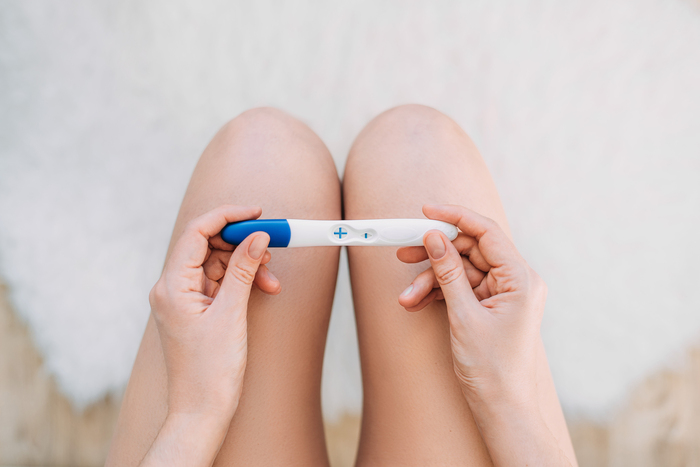Fertility issues are often shrouded in misconceptions, with many people attributing difficulties in conceiving solely to age or reproductive health. While it’s true that age and the health of the reproductive system play significant roles in fertility, these factors only scratch the surface of what can influence one’s ability to conceive. Fertility is a complex interplay of various bodily systems, environmental factors and lifestyle choices. Surprisingly, several conditions that might seem unrelated at first glance can significantly impact fertility. Understanding these lesser-known factors is crucial for those trying to conceive, as it can help identify and address potential obstacles more effectively. Here, we explore five conditions you might not know could affect fertility.
1. Thyroid Disorders

The thyroid gland is a small but mighty organ crucial in regulating metabolism and hormone production, both essential for reproductive health. Thyroid disorders, such as hypothyroidism (underactive thyroid) and hyperthyroidism (overactive thyroid), can significantly impact fertility.
In women, an underactive thyroid can lead to prolonged menstrual cycles, heavy periods, or even the absence of menstruation. This occurs because insufficient thyroid hormones interfere with the production of sex hormones like estrogen and progesterone. The resulting hormonal imbalance can prevent the maturation and release of eggs, hampering ovulation and making it difficult to conceive [1]. In men, though less common, low thyroid hormone levels can result in decreased testosterone levels, which are associated with erectile dysfunctions, delayed ejaculation and deteriorated semen quality [2].
Conversely, an overactive thyroid can cause irregular menstrual cycles and lighter, shorter periods in women. Excess thyroid hormones can accelerate metabolism and disrupt the normal balance of reproductive hormones such as follicle-stimulating hormone and luteinising hormone, leading to irregular ovulation or even the complete absence of ovulation [3]. In men, elevated thyroid hormone levels affect testosterone levels, thereby affecting testicular functions, semen volume and quality [4].
In TCM, thyroid disorders are often linked to imbalances in Yin and Yang. Hypothyroidism is often associated with Yang deficiency, which leads to a dip in overall Qi and energy levels. This imbalance can manifest as fatigue, sensitivity to cold and constipation. On the other hand, hyperthyroidism is attributed to Yin deficiency, resulting in a dehydrated body constitution with symptoms such as dry skin and eyes, heart palpitations and weight loss.
TCM offers a holistic approach to regulating thyroid function and improving overall fertility through personalised herbal medication and acupuncture. Herbal formulas are tailored to each individual’s needs, nourishing Yin or Yang as required, while acupuncture helps harmonise the body’s energy flow, promoting optimal thyroid health and enhancing fertility. Tech-enhanced therapies like Electro-Lymphatic Therapy (ELT) help stimulate lymphatic flow to improve circulation and regulate the flow of hormones while Cell Pro Therapy introduces reducing electrons into the body, helping to improve cellular metabolism and oxygenation, further supporting thyroid health. With this comprehensive approach, individuals can achieve a better hormonal balance, paving the way for improved reproductive health and increased chances of conception.
2. Polycystic Ovary Syndrome (PCOS)

Polycystic Ovary Syndrome (PCOS) is a hormonal disorder that is becoming increasingly more common, affecting an estimated 8–13% of women of reproductive age, with up to 70% of cases remaining undiagnosed [5]. PCOS is characterised by irregular menstrual cycles, excess androgen levels and polycystic ovaries. Women with PCOS may have elevated levels of hormones such as estrogen, luteinising hormone and anti-müllerian hormone. These hormones regulate menstruation and ovulation by controlling the growth of the uterine lining and triggering ovulation. Disruptions in these hormone levels interfere with ovulation, making it difficult to conceive [6].
In TCM, PCOS is associated with Phlegm-Dampness accumulation and Blood stagnation. A modern sedentary lifestyle, combined with a diet high in processed and fatty foods, can impact our Spleen, or digestive system in TCM. This causes an uneven distribution of nutrients and fluids in our body, an accumulation Phlegm-Dampness, resulting in symptoms such as weight gain, oily skin and a lowered metabolism. Additionally, this accumulation can disrupt the flow of Blood, causing it to stagnate and accumulate in the womb, which affects reproductive organ function and creates a less-than-ideal environment for conception.
Despite being one of the leading causes of infertility in women, PCOS can be managed with herbal medication, acupuncture and lifestyle modifications. Herbal medications are prescribed to address root issues, such as removing Phlegm-Dampness from the body, while acupuncture helps to regulate organ energy and hormone levels. Tech-enhanced therapies such as Electro-Lymphatic Therapy help promote smooth lymphatic flow, which boosts circulation and alleviates symptoms caused by Phlegm-Dampness. Improved lymphatic flow also helps regulate hormone levels and create a uterine environment that is more conducive for pregnancy. Together, TCM and tech-enhanced therapies work to regulate menstruation, balance hormone levels and increase the chances of getting pregnant.
3. Endometriosis

Endometriosis is characterised by severe pain in the abdomen or lower back during menstruation. This condition occurs when tissue similar to the lining of the uterus grows outside the uterine cavity. Each month, when the uterine lining sheds during menstruation, this tissue outside the uterus also sheds into the abdomen, leading to severe pain, chronic inflammation and scar tissue formation. These scars can create adhesions between reproductive organs, distorting pelvic anatomy, including the fallopian tubes and ovaries. This distortion can interfere with the release and transport of eggs, hindering their journey to meet sperm for fertilisation. Additionally, the inflammatory environment created by endometriosis is hostile to sperm, eggs, and embryos, making fertilisation and implantation more challenging [7].
Endometriosis is often underdiagnosed because its symptoms can be mistaken for regular menstrual pain. Early diagnosis and treatment can significantly improve fertility outcomes for those trying to conceive.
In TCM, endometriosis is associated with Blood stagnation in the womb. Blood stagnation can result from Qi stagnation, Cold accumulation or Dampness. These factors disrupt the normal flow of Qi and Blood, leading to pain and poor womb conditions for fertility.
TCM offers effective treatments for endometriosis through acupuncture and moxibustion, which help relieve pain, expel Cold, and balance uterine conditions. With a proper diagnosis, herbal medication can address underlying imbalances and restore harmony in the body. Electro-Lymphatic Therapy and Cell Pro Therapy further complement TCM treatments by increasing circulation to the womb and promoting the removal of metabolic waste from the body. By promoting smooth Qi and Blood flow, these treatments can improve uterine health and enhance fertility, offering a holistic approach to managing endometriosis and supporting reproductive well-being.
Learn more about Treating Endometriosis with the help of TCM
4. Autoimmune diseases

Autoimmune diseases can significantly impact fertility, yet they are often overlooked when considering factors that influence the ability to conceive. Conditions like lupus, rheumatoid arthritis, and celiac disease involve the immune system mistakenly attacking the body’s tissues, leading to chronic inflammation. This inflammation can interfere with the hypothalamic-pituitary-ovarian (HPO) axis, which regulates menstrual cycle and ovulation in women. Inflammatory cytokines can disrupt the production and regulation of reproductive hormones such as estrogen and progesterone, leading to irregular menstrual cycles and ovulation. In men, chronic inflammation impairs sperm production and function, affecting sperm count, motility and morphology.
Medications taken for autoimmune diseases may also negatively impact the reproductive system. For example, cyclophosphamide can be gonadotoxic, harming the ovaries and reducing ovarian reserve, potentially leading to premature ovarian failure [8]. Nonsteroidal anti-inflammatory drugs (NSAIDs) may also inhibit ovulation if taken frequently [9].
In TCM, autoimmune diseases are viewed as imbalances in the body’s vital Qi, Yin, and Yang. Our vital Qi is responsible for immunity and defending the body against external pathogens. When vital Qi is deficient, the immune response is not effectively regulated, leading to a hyperactive immune system and inflammation in the body. The body is also more susceptible to illnesses due to pathogenic factors such as Dampness, Heat, and Wind.
TCM approaches the treatment of autoimmune diseases with a holistic strategy, using acupuncture and herbal medicine to restore balance and harmony within the body. Acupuncture helps regulate the immune response and reduce inflammation, while herbal medicine supports the body’s vital Qi and balances Yin and Yang. Tech-enhanced treatments such as Cell Pro Therapy introduce reducing electrons in the body, which help to combat free radical damage, clear inflammation and strengthen immunity[10]. Together, these treatments can enhance reproductive health and increase the chances of successful conception for individuals with autoimmune diseases.
5. Obesity

The negative effects of obesity on health are well-documented, and its impact on fertility outcomes in both men and women is significant.
In women, excess body fat is linked to menstrual disorders, premature ovarian failure and an increased risk of miscarriage [11]. Increased body weight and fat tissue disrupt the balance of sex hormones, including androgens and estrogens, creating unfavourable conditions for conception.
In men, obesity is linked to poor sperm quality, characterised by lower sperm concentration, sperm count, sperm motility and poor morphology [12]. Obesity also correlates with lower testosterone levels, contributing to issues like erectile dysfunction and infertility [13].
In TCM, obesity is viewed as stemming from imbalances such as Spleen Qi deficiency and Phlegm-Dampness. As the Spleen plays a central role in digestion and metabolism, a deficiency in Spleen Qi leads to poor digestion, and can cause an accumulation of Phlegm-Dampness in the body. This results in weight gain and symptoms such as fatigue, bloating, and a sense of heaviness in the body.
Achieving a healthy weight through a balanced diet and regular exercise is crucial for improving fertility and increasing the likelihood of conception. TCM offers holistic treatments such as acupuncture, cupping, and herbal medicine to support healthy weight loss in a natural way. Electro-Lymphatic Therapy helps promote a healthy detoxification in the body by stimulating proper lymphatic drainage and the removal of metabolic wastes, thus improving metabolism.
Cell Pro Therapy further helps to promote cell metabolism by neutralising free radical damage and improving cell health. These therapies help restore balance in the body, enhance metabolism, and promote overall well-being, which in turn can optimise reproductive health.
Your healing is the most important!
When navigating fertility challenges, it’s essential to look beyond age and reproductive health alone. Factors such as thyroid disorders, PCOS, endometriosis, autoimmune diseases, and obesity can profoundly impact fertility in both men and women. Understanding these complex interactions and how hormones, immune responses, and metabolic health intertwine is crucial.
If you and your partner are planning to conceive, it is advisable for both of you to seek medical advice and fertility evaluations early on. These assessments can uncover underlying conditions that may go unnoticed yet significantly affect fertility. Consulting a TCM physician can provide comprehensive insights and personalised treatments for enhancing reproductive health. By embracing a holistic approach that considers the intricate interplay of physical, hormonal, and lifestyle factors, individuals are empowered to navigate their family planning journey.
This article is written by Physician Amanda Kok (Oriental Remedies Group, Singapore), a registered TCM physician certified by the Traditional Chinese Medicine Practitioners Board (TCMPB).

Disclaimer:
The content on this page is for information and educational purposes only. Such medical information may relate to disease, injury, drugs and other treatments, medical devices and/or health products. Medical information does not amount to advice, and if advice is needed an appropriate professional help should be sought. The disclaimer asserts that no warranties or representations are given in respect of the medical information, and that the website operator should not be held liable if a user suffers any injury or loss after relying upon the medical information.
Any devices used for technology-enhanced therapies are intended for use only for general well-being purposes or to encourage or maintain a healthy lifestyle, and is not intended to be used for any medical purpose (such as the detection. diagnosis, monitoring, management or treatment of any medical condition or disease). Any health-related information provided by this device or software should not be treated as medical advice.
References:
[3] https://www.sciencedirect.com/science/article/pii/S0015028200015892
[4] https://journals.lww.com/apjr/fulltext/2019/08050/Thyroid_hormones_in_male_reproduction_and.4.aspx
[5] https://www.who.int/news-room/fact-sheets/detail/polycystic-ovary-syndrome
[6] https://www.sciencedirect.com/science/article/abs/pii/S175172141830191X
[7] https://journals.sagepub.com/doi/full/10.2217/whe.15.48
[8] https://www.tandfonline.com/doi/abs/10.1080/1744666X.2020.1724091
[9] https://pubmed.ncbi.nlm.nih.gov/16493584/
[10] https://ieeexplore.ieee.org/abstract/document/1341534
[11] https://academic.oup.com/humupd/article/9/4/359/737350
[12] https://www.sciencedirect.com/science/article/pii/S0015028208033529#bib6
[13] https://www.sciencedirect.com/science/article/abs/pii/S0022534705665408

